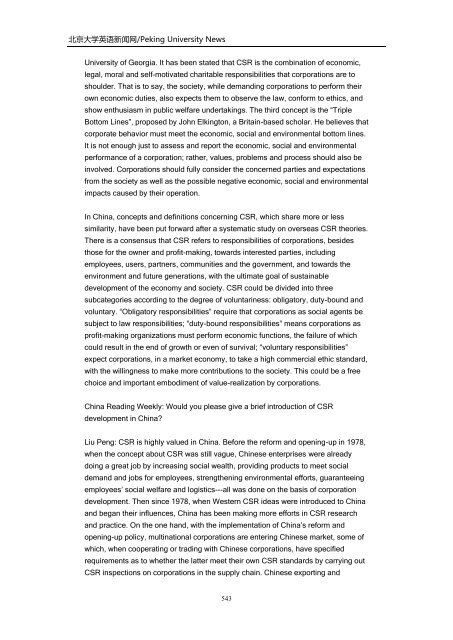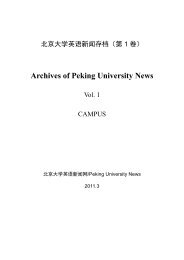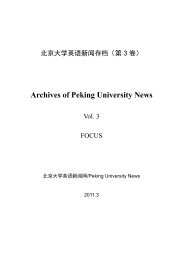Archives of Peking University News - PKU English - 北京大学
Archives of Peking University News - PKU English - 北京大学
Archives of Peking University News - PKU English - 北京大学
Create successful ePaper yourself
Turn your PDF publications into a flip-book with our unique Google optimized e-Paper software.
<strong>北京大学</strong>英语新闻网/<strong>Peking</strong> <strong>University</strong> <strong>News</strong><br />
<strong>University</strong> <strong>of</strong> Georgia. It has been stated that CSR is the combination <strong>of</strong> economic,<br />
legal, moral and self-motivated charitable responsibilities that corporations are to<br />
shoulder. That is to say, the society, while demanding corporations to perform their<br />
own economic duties, also expects them to observe the law, conform to ethics, and<br />
show enthusiasm in public welfare undertakings. The third concept is the ―Triple<br />
Bottom Lines‖, proposed by John Elkington, a Britain-based scholar. He believes that<br />
corporate behavior must meet the economic, social and environmental bottom lines.<br />
It is not enough just to assess and report the economic, social and environmental<br />
performance <strong>of</strong> a corporation; rather, values, problems and process should also be<br />
involved. Corporations should fully consider the concerned parties and expectations<br />
from the society as well as the possible negative economic, social and environmental<br />
impacts caused by their operation.<br />
In China, concepts and definitions concerning CSR, which share more or less<br />
similarity, have been put forward after a systematic study on overseas CSR theories.<br />
There is a consensus that CSR refers to responsibilities <strong>of</strong> corporations, besides<br />
those for the owner and pr<strong>of</strong>it-making, towards interested parties, including<br />
employees, users, partners, communities and the government, and towards the<br />
environment and future generations, with the ultimate goal <strong>of</strong> sustainable<br />
development <strong>of</strong> the economy and society. CSR could be divided into three<br />
subcategories according to the degree <strong>of</strong> voluntariness: obligatory, duty-bound and<br />
voluntary. ―Obligatory responsibilities‖ require that corporations as social agents be<br />
subject to law responsibilities; ―duty-bound responsibilities‖ means corporations as<br />
pr<strong>of</strong>it-making organizations must perform economic functions, the failure <strong>of</strong> which<br />
could result in the end <strong>of</strong> growth or even <strong>of</strong> survival; ―voluntary responsibilities‖<br />
expect corporations, in a market economy, to take a high commercial ethic standard,<br />
with the willingness to make more contributions to the society. This could be a free<br />
choice and important embodiment <strong>of</strong> value-realization by corporations.<br />
China Reading Weekly: Would you please give a brief introduction <strong>of</strong> CSR<br />
development in China?<br />
Liu Peng: CSR is highly valued in China. Before the reform and opening-up in 1978,<br />
when the concept about CSR was still vague, Chinese enterprises were already<br />
doing a great job by increasing social wealth, providing products to meet social<br />
demand and jobs for employees, strengthening environmental efforts, guaranteeing<br />
employees‘ social welfare and logistics---all was done on the basis <strong>of</strong> corporation<br />
development. Then since 1978, when Western CSR ideas were introduced to China<br />
and began their influences, China has been making more efforts in CSR research<br />
and practice. On the one hand, with the implementation <strong>of</strong> China‘s reform and<br />
opening-up policy, multinational corporations are entering Chinese market, some <strong>of</strong><br />
which, when cooperating or trading with Chinese corporations, have specified<br />
requirements as to whether the latter meet their own CSR standards by carrying out<br />
CSR inspections on corporations in the supply chain. Chinese exporting and<br />
543




